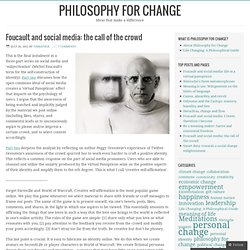

Foucault and social media: the call of the crowd. This is the final instalment in a three-part series on social media and ‘subjectivation’ (Michel Foucault’s term for the self-construction of identity).

Part one discusses how the open commons ideal of social media creates a ‘virtual Panopticon’ effect that impacts on the psychology of users. I argue that the awareness of being watched and implicitly judged by the material we post online (including likes, shares, and comments) leads us to unconsciously aspire to please and/or impress a certain crowd, and to select content accordingly. Part two deepens the analysis by reflecting on author Peggy Orenstein’s experience of Twitter. Orenstein’s awareness of the crowd spurred her to work even harder to craft a positive identity. This reflects a common response on the part of social media prosumers. Forget Farmville and World of Warcraft. This last point is crucial. Creative self-affirmation is an artistic activity, it is true.
What about engaging with multiple crowds? Like this: Foucault and social media: I tweet, therefore I become. This is the second instalment in a three-part series. Part one discusses how the open commons ideal of social media creates a ‘virtual Panopticon’ effect that impacts on the psychology of users. I argue, building on Michel Foucault’s account of the Panopticon: There is a self-reflexive structure to sharing content on Facebook or Twitter. Just as actors on stage know that they are being watched by the audience and tailor their behaviour to find the best effect, effective use of social media implies selecting and framing content with a view to pleasing and/or impressing a certain crowd. We may not intend to do this but it is essential to doing it well.
Part two continues the Foucaultian interrogation of social media looking at Foucault’s concept of subjectivation. ‘Never stop sculpting your own statue’, the ancient philosopher Plotinus said. Peggy Orenstein came late to Twitter. Orenstein approached her Twitter experiment with the studious detachment of the field anthropologist. Foucault and social media: life in a virtual panopticon. This is the first instalment in a three-part series.
Part 2. I tweet, therefore I become Part 3. The call of the crowd You start the day bleary-eyed and anxious. You stayed up late last night working on a post for your blog, gathering facts and memes from about the web and weaving them into an incisive whole. You jump on HootSuite and start sharing targeted content: Facebook for friends, tweets for professional contacts. How did we ever get by without social media? The French philosopher Michel Foucault (1926-1984) has a set of insights that can help clarify how social media affects us on a psychological level. A Foucaultian perspective on social media targets the mechanism that makes it tick: sharing.
‘I sent this – it is part of my work. Foucault understood how being made constantly visible impacts on us psychologically. Bentham’s Panopticon, Foucault argues, functions to make prisoners take responsibility for regulating their behaviour. In sharing online, we are playing to a crowd.